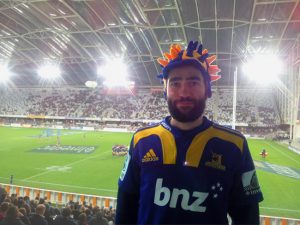Current position: Lab leader at BASF Construction Chemicals in Trostberg, Germany (starting July 2019) working on concrete chemistry.
Post-doc positions: Institut de Science et d’Ingénierie Supramoléculaires (ISIS) with Professor Jean-Marie Lehn, Strasbourg, France (2014-2018), then with the Bioteam/ICPEES with Prof. Luc Avérous (2018-2019).
PhD: University of Otago, with Professor Sally Brooker (2011-2014) on a MacDiarmid Institute PhD scholarship (New Zealand)
MSc: Paul Sabatier University, Toulouse, France, under the supervision of Professor Jean-Pascal Sutter / Hiroshima University, Japan, under the supervision of Professor Katsuya Inoue (2009-2010)
BSc: Paul Sabatier University, Toulouse, France, under the supervision of Professor Jean-Pascal Sutter (2007-2008)
Sebastien at a Highlanders game at Forsyth Barr Stadium, Dunedin
I joined Sally’s group in 2011 as a PhD student. I am grateful for the opportunity Sally gave me and I thoroughly enjoyed my time in Dunedin, both on a professional and a personal level. Working with her has been a wonderful experience. The chemistry department is a small and friendly department that gives the student a more hands-on approach, as opposed to what I’ve found in bigger departments. Consequently, my relationship with Sally was fruitful on a daily basis; I didn’t have to wait a long time to have a meeting, which makes everything easier when you’re doing a PhD. We have already published three papers together, are close to submitting another, and have another two papers well underway.
More specifically, as an inorganic chemist specialising in molecular magnetism, I was keen to learn more about techniques such as X-ray crystallography and SQUID magnetometry. The in-house instrument, an Agilent SuperNova, is readily available. Students can get training quickly and use it by themselves, which allowed me to acquire good crystallography skills, from growing and mounting crystals, to collecting data, to solving and refining the structure to publication standards. For magnetic measurements, I had the opportunity to be trained and then run the SQUID at the Robinson Research Institute in Lower Hutt by myself, which was a great experience. Sally also has a lot of international collaborators, like Dr. Rodolphe Clérac, an expert in the field of molecular magnetism. He visited us in Dunedin twice and I had the chance to visit him in Bordeaux, so I was also able to learn a lot from him during my PhD.
I went on to spend 4 years as a post-doc researcher in Strasbourg, France. I spent 3 years in the group of Prof. Lehn working on dynamic chemistry (2 years on purely academic research, then 1 year of industrial research in collaboration with GSK). This was a wonderful opportunity for me to understand academic research on a deeper level and further my understanding of chemistry by working on different types of chemistry. After this, I took a one-year position in a polymer research group with Prof. Averous to work on bio-based polymers, where I was in charge of developing an entire project. This allowed me to gain knowledge on a field relevant to industry and further develop my independence in terms of project leadership. Throughout my PhD and my postdoc positions, I knew I was attracted to industrial research more than academia, and I used these different opportunities to refine my goals and what was needed to achieve them.
During my time in New Zealand, I had the opportunity to visit most places in this beautiful country, but also to do a lot of different things here around the university: I have been part of different music bands (choir, ukulele group, taiko group), I have played football (soccer!) for the whole time I was here, I even had the chance to do a radio show on French music on the student radio, Radio One, and to try my hand at cricket. Dunedin and the University of Otago form a great community which will always be special to me.


